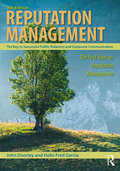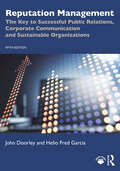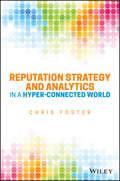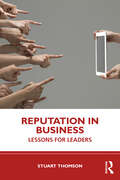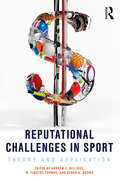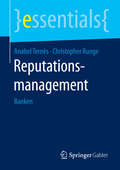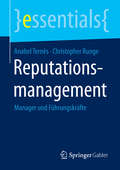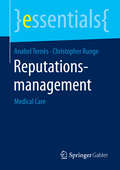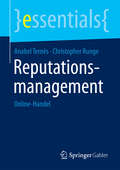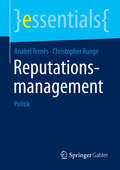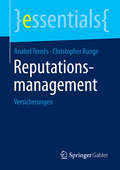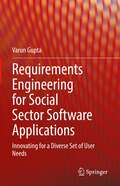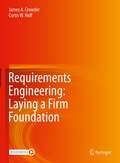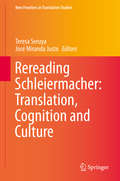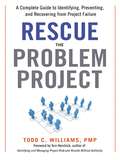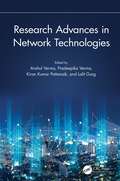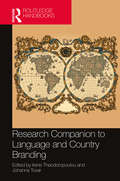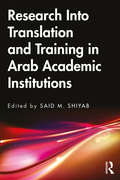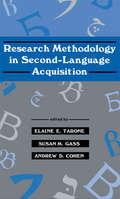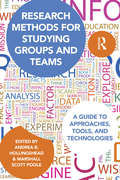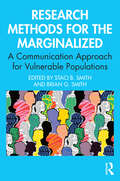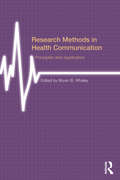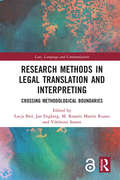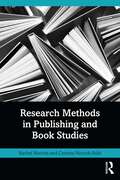- Table View
- List View
Reputation Management: The Key to Successful Public Relations and Corporate Communication
by John Doorley Helio Fred GarciaReputation Management is an established how-to guide for students and professionals, as well as CEOs and other business leaders. This fourth edition is updated throughout, including: new social media management techniques for the evolving age of digital media, and perspectives on reputation management in an era of globalization. The book is embroidered by ethics, and organized by corporate communication units, such as media relations, issues management, crisis communication, organizational communication, government relations, and investor relations. Each chapter is fleshed out with the real-world experiences cited by the authors and contributions from 36 leaders in the field, including The Arthur W. Page Society, the International Communications Consultancy Organization, the PR Council, CVS Health, Edelman and Ketchum. This was the first book on reputation management and, now in its fourth edition, remains a must-have reference for students taking classes in public relations management, corporate communication, communication management, and business. CEOs, business leaders, and professionals working in these areas find it a reliable resource for measuring, monitoring and managing reputation.
Reputation Management: The Key to Successful Public Relations, Corporate Communication and Sustainable Organizations
by John Doorley Helio Fred GarciaThe fifth edition of this classic text, which was the first on the subject of reputation management, gives readers the guidance and skills needed to manage brand and reputation through effective performance, behavior, identity and communication strategies.This edition is updated throughout, including current information on digital media, new global examples and a renewed emphasis on organizational and environmental sustainability. Each chapter again features timely and illustrative cases by the authors and contributions from leaders in the field, with new cases in this edition on such topics as COVID-19, artificial intelligence, and generative AI. Additionally, the book maintains its consistent throughline focusing on corporate ethics.This fifth edition is a must-have reference for students taking classes in public relations management, corporate communication, communication management and business. CEOs, business leaders and professionals working in these areas find it a reliable resource for measuring, monitoring and managing reputation.Online resources also accompany the text. Please visit www.routledge.com/9781032577999.
Reputation Strategy and Analytics in a Hyper-Connected World
by Chris FosterReputation management techniques that work amidst the unceasing flow of information Reputation Strategy and Analytics in a Hyper-Connected World is a complete guide to corporate communications and reputation management. Covering a range of scenarios from ideal to catastrophic, this book provides a clear blueprint for preparation, execution, and beyond. The discussion focuses on data-driven, evidence-based strategies for the modern digital economy, providing actionable frameworks, practical roadmaps, and step-by-step blueprints for deploying advance analytics, predictive modeling, and big data techniques to successfully manage communications and reputation. You'll learn how the right tools and people get the job done quickly, effectively, and cost-effectively, and how to identify and acquire the ones you need. Coverage includes the latest technology and cutting-edge applications, bringing you up to speed on what excellence in communications can realistically be. We live in an age of interconnectedness and transparency, and information travels at the speed of light to reach nearly every corner of the globe. This book shows you the key strategies and operational tactics required to respond successfully to financially damaging assaults on your company's reputation. Execute world-class corporate communications Prepare for best- and worst-possible case scenarios Manage organizational reputation in the digital economy Pick the right team and the right tools to get the job done Stories, rumors, lies -- there is no safe haven. Big data, cloud, and mobile technologies are fueling a perfect storm of immense proportions, overwhelming the capabilities of organizations and individuals attempting to manage their brands and reputations when hit with damaging information or harmful stories. Reputation Strategy and Analytics in a Hyper-Connected World shows you navigate the never-ending information stream to keep your company out of the undertow.
Reputation in Business: Lessons for Leaders
by Stuart ThomsonA compelling mix of reputation management, crisis leadership and the role of politics in business, this book provides unique practical steps that leaders can take to protect their reputations and those of the organisations they head in an ever more open social media-led world. Although leaders increasingly recognise the vital intangible asset that reputation represents, too many do not really understand what reputation is and the steps that should be taken to build it and their corporate value. Given the range of factors depending on the organisation, each aspect of its complex reputational story needs to be unpicked if a reputation is to be built, maintained and protected. This step by-step-guide offers advice on how to develop the strategies needed to do this, provides clear lessons throughout from a range of experts - and distinctively, looks beyond the corporate sector to charities, governments, NGOs and the public sector. Boards, trustees, non-executive directors, senior management, and leaders of all types of organisations need to consider the steps that should be taken to build, maintain and defend their reputation, and that means knowing what their reputation is and the audiences that matter most to them. This book is the roadmap.
Reputational Challenges in Sport: Theory and Application
by Andrew C. Billings Timothy Coombs Kenon A. BrownIssues of reputation management are negotiated in a wide array of contexts, yet arguably one of the most visible of these areas involves how such stories unfold within the sporting arena. Whether involving individual athletes, teams, organizations, leagues, or global entities, the process of navigating issues of image repair and/or restoration and crisis-based communication has never been more byzantine with a plethora of communicative media outlets functioning in myriad manners. Reputational Challenges in Sport explores the intersection of reputation, sport, and society. In doing so, the book advances theory and then explores individual, team, and organizational applications from varied methodological perspectives as they relate to reputation and identity management and crisis orientations. The book provides a synthesis of previous works while offering a contemporary advancement of these subjects from a variety of epistemological approaches. It gives voice to variety of perspectives that offer a robust advancement of issues relating to reputation, sport, and modern society.
Reputationsmanagement: Banken (essentials)
by Anabel Ternès Christopher RungeAnabel Ternès und Christopher Runge zeigen am Beispiel Banken, dass es sich auszahlt, in eine hohe Reputation zu investieren. Unternehmen mit einem guten Ansehen können höhere Preise verlangen, Kunden gewinnen und binden, die besten Mitarbeiter für sich gewinnen und insbesondere in Krisenzeiten von ihrer Reputation als immateriellem Wert als Wettbewerbsvorteil zehren. Voraussetzung hierfür ist ein systematisches, professionell begleitetes Reputationsmanagement, das gewährleistet, in Zukunft zu agieren statt nur zu reagieren. Gutes Reputationsmanagement erfordert einzelne, aufeinander abgestimmte Schritte, die sich gegenseitig perfekt ergänzen – zum Aufbau, zum Erhalt und zur Verbesserung einer positiven Unternehmensreputation.
Reputationsmanagement: Manager und Führungskräfte (essentials)
by Anabel Ternès Christopher RungeAnabel Ternès und Christopher Runge zeigen am Beispiel von Managern und Führungskräften, dass es sich auszahlt, in eine hohe Reputation zu investieren. Binnen Sekunden verbreiten sich schlechte Nachrichten und Bewertungen über soziale Netzwerke und Internetforen. Eine negative Information entwickelt auf diese Weise schnell ein unkontrollierbares Eigenleben – mit unabsehbaren Folgen. Gerade für Manager und Führungskräfte ist es wichtig, stets den Überblick zu haben, was „das Netz“ über die eigene Person oder das eigene Unternehmen sagt. Eine schlechte Reputation kann nicht nur zu Umsatzeinbußen führen, sondern den guten Ruf nachhaltig schädigen. Wichtig ist daher, proaktiv vorzubauen, um den guten Ruf im Netz zu schützen.
Reputationsmanagement: Medical Care (essentials)
by Anabel Ternès Christopher RungeAnabel Ternès und Christopher Runge zeigen am Beispiel Banken, dass es sich auszahlt, in eine hohe Reputation zu investieren. Unternehmen mit einem guten Ansehen können höhere Preise verlangen, Kunden gewinnen und binden, die besten Mitarbeiter für sich gewinnen und insbesondere in Krisenzeiten von ihrer Reputation als immateriellem Wert als Wettbewerbsvorteil zehren. Voraussetzung hierfür ist ein systematisches, professionell begleitetes Reputationsmanagement, das gewährleistet, in Zukunft zu agieren statt nur zu reagieren. Gutes Reputationsmanagement erfordert einzelne, aufeinander abgestimmte Schritte, die sich gegenseitig perfekt ergänzen - zum Aufbau, zum Erhalt und zur Verbesserung einer positiven Unternehmensreputation.
Reputationsmanagement: Online-Handel (essentials)
by Anabel Ternès Christopher RungeAnabel Ternès und Christopher Runge zeigen am Beispiel des Online-Handels, dass es sich auszahlt, in eine hohe Reputation zu investieren. Räumliche Grenzen existieren in Zeiten von Social Media nicht mehr. Binnen Sekunden verbreiten sich schlechte Nachrichten und Bewertungen über soziale Netzwerke und Internetforen – ob sie nun der Wahrheit entsprechen oder nicht. Eine negative Information entwickelt auf diese Weise schnell ein unkontrollierbares Eigenleben – mit unabsehbaren Folgen. Gerade im Online-Handel ist es wichtig, stets den Überblick zu behalten, was „das Netz“ über das eigene Unternehmen sagt. Negative Kundenbewertungen und schlechte Presse können zu Umsatzeinbußen führen und den Ruf nachhaltig schädigen. Wichtig ist daher, proaktiv vorzubauen, um den guten Ruf im Netz zu schützen – mit einem professionellen Partner an der Seite, der strategisch vorausplant.
Reputationsmanagement: Politik (essentials)
by Anabel Ternès Christopher RungeAnabel Ternès und Christopher Runge zeigen am Beispiel Politik, dass es sich auszahlt, in eine hohe Reputation zu investieren. Gerade wer ein politisches Amt bekleidet, steht besonders im Fokus der öffentlichen Aufmerksamkeit. Jede Geste, jedes Wort kann von sozialen Netzwerken und Online-Medien aufgegriffen und in Windeseile verbreitet werden. Klassische Medien wie Tageszeitungen, Magazine und auch TV-Sendungen verbreiten die Nachricht zusätzlich weiter, und im Nu ist ein Skandal entstanden, dessen Folgen unabsehbar sind und oftmals das Ende der Karriere bedeuten. Wichtig ist daher, proaktiv vorzubauen, um den guten Ruf im Netz zu schützen – mit einem professionellen Partner an der Seite.
Reputationsmanagement: Versicherungen (essentials)
by Anabel Ternès Christopher RungeAnabel Ternès und Christopher Runge zeigen am Beispiel Versicherungen, dass es sich auszahlt, in eine hohe Reputation zu investieren. Unternehmen mit einem guten Ansehen können höhere Preise verlangen, Kunden gewinnen und binden, die besten Mitarbeiter für sich gewinnen und insbesondere in Krisenzeiten von ihrer Reputation als immateriellem Wert als Wettbewerbsvorteil zehren. Voraussetzung hierfür ist ein systematisches, professionell begleitetes Reputationsmanagement, das gewährleistet, in Zukunft zu agieren statt nur zu reagieren. Gutes Reputationsmanagement erfordert einzelne, aufeinander abgestimmte Schritte, die sich gegenseitig perfekt ergänzen – zum Aufbau, zum Erhalt und zur Verbesserung einer positiven Unternehmensreputation.
Requirements Engineering for Social Sector Software Applications: Innovating for a Diverse Set of User Needs
by Varun GuptaThis book presents interdisciplinary research in software engineering with applications for the social sector. The author focuses on software applications that are used for social good and that serve the needs of society. The author aims to bridge the knowledge gap between requirement engineers, industry, and users in order to help identify a diverse range of needs in the social sector (taking into account user crowd diversity in terms of technological competencies, geography, demographics, and behavioral and psychographic aspects). The book provides rigorous empirical studies and validates solutions that serve as a guide to the software engineering community, researchers, graduate students, and teachers.Provides interdisciplinary research in software engineering and the needs of the social sector, helping to increase success rates of society focused startups and applicationsIdeal for social entrepreneurs who can use the book for doing customer development with diverse usersEstablishes a new research line of social sector requirement engineering, taking into account user age, language, ability, and access
Requirements Engineering für Softwareanwendungen im sozialen Sektor: Innovationen für eine Vielzahl von Nutzerbedürfnissen
by Varun GuptaDieses Buch stellt interdisziplinäre Forschung im Bereich Software-Engineering von Anwendungen für den sozialen Sektor vor. Der Autor konzentriert sich auf Softwareanwendungen, die für soziale Zwecke eingesetzt werden und den Bedürfnissen der Gesellschaft dienen. Der Autor möchte die Wissenslücke zwischen den Requirements Engineers, der Industrie und den Nutzern schließen, um dazu beizutragen, ein breites Spektrum an Bedürfnissen im sozialen Sektor zu identifizieren (unter Berücksichtigung der Vielfalt der Nutzergruppen in Bezug auf technologische Kompetenzen, Geografie, Demografie sowie verhaltensbezogene und psychografische Aspekte). Das Buch bietet rigorose empirische Studien und validierte Lösungen, die als Leitfaden für die Software-Engineering-Gemeinschaft sowie Forscher, Doktoranden und Lehrer dienen. - Bietet interdisziplinäre Forschung im Bereich Software-Engineering sowie den Bedürfnissen des sozialen Sektors und trägt dazu bei, die Erfolgsquote von auf die Gesellschaft ausgerichteten Startups und Anwendungen zu erhöhen- Ideal für soziale Unternehmer, um das Buch für die Kundenentwicklung mit verschiedenen Nutzern nutzen zu können - Etabliert eine neue Forschungslinie für die Entwicklung von Anforderungen im sozialen Sektor, die Alter, Sprache, Fähigkeiten und Zugang der Nutzer berücksichtigt.
Requirements Engineering: Laying a Firm Foundation
by James A. Crowder Curtis W. HoffThis textbook lays the foundations for System-of-Systems Requirements Engineering and Requirements Management practices, principles, technique, and processes. It provides a comprehensive treatment of requirements engineering, an integral part of Multidisciplinary Systems Engineering. The book takes the student/reader though the entire process of documenting, analyzing, tracing, prioritizing, and managing requirements, and then goes on the describe controlling and communicating requirement change throughout the system development lifecycle. The authors discuss the role of requirements management in support of other requirements engineering processes; describe the principal requirements engineering activities and their relationships; introduces techniques for requirements elicitation and analysis and describes requirements validation and the role of requirements reviews; and discusses the role of requirements management in support of other requirements engineering processes. A full suite of classroom material is provided including exercises, assignments, and PowerPoint slides.
Rereading Schleiermacher: Translation, Cognition and Culture
by Teresa Seruya José Miranda JustoThis book celebrates the bicentenary of Schleiermacher's famous Berlin conference "On the Different Methods of Translating" (1813). It is the product of an international Call for Papers that welcomed scholars from many international universities, inviting them to discuss and illuminate the theoretical and practical reception of a text that is not only arguably canonical for the history and theory of translation, but which has moreover never ceased to be present both in theoretical and applied Translation Studies and remains a mandatory part of translator training. A further reason for initiating this project was the fact that the German philosopher and theologian Friedrich Schleiermacher, though often cited in Translation Studies up to the present day, was never studied in terms of his real impact on different domains of translation, literature and culture.
Rescue the Problem Project: A Complete Guide to Identifying, Preventing, and Recovering from Project Failure
by Todd C. WilliamsThis one-of-a-kind guide provides project managers, executives, and customers alike with an in-depth start-to-finish process that ensure win-win solutions when things go awry. Turnaround specialist Todd Williams has worked with dozens of companies in multiple industries to help them bring projects back from the brink of disaster. Now, in a market full of how-tos on the task of running a project, he shares his wisdom to help you do the same.In Rescue the Problem Project, you will learn: techniques for identifying the root causes of problems;steps for putting projects back on track--including auditing the project, analyzing the data,negotiating the solution, and executing a new plan;and guidelines for avoiding problems in the future.When projects are failing, rather than pointing fingers at the project team or responding emotionally, what is needed is an objective process for accurately assessing the problem and mapping a clear plan of action to fix it. With real-world examples of what works, what doesn&’t, and why, Rescue the Problem Project offers the tools you need to ensure your project is one of the select few to experience major success.
Research Advances in Network Technologies
by Anshul Verma Lalit Garg Pradeepika Verma Kiran Kumar PattanaikIn current digital era, information is an important asset for our daily life as well as for small and large-scale businesses. The network technologies are the main enablers that connect the computing devices and resources together to collect, process and share vital information locally as well as globally. The network technologies provide efficient, flexible and seamless communication while maximizing productivity and resources for our day-to-day lives and business operations. For all its importance, this domain has evolved drastically, from the traditional wired networks to Bluetooth, infrared-waves, micro-waves, radio-waves and satellite networks. Nowadays, network technologies are not only restricted to computer laboratories, offices or homes; many other diverse areas have been witnessed where network technologies are being used based on the applications and needs, such as vehicular ad-hoc networks, underwater networks, and the Internet of Things. Along with the hardware-based and physical network technologies, a lot of research has been carried out by researchers from academia and industry to develop emerging software-based network technologies, such as network software architectures, middleware, and protocol stacks. The software-based network technologies become the main driving force behind the paradigm shift in this domain and have invented many new network technologies such as grid computing, cloud computing, fog computing, edge computing, software defined networks, content centric networks and so on. On the other hand, a lot of efforts have been made in cellular network technologies to improve the user experience and as a consequence, emerging cellular network technologies like LTE, VoLTE and 5G have been invented. Due to its demand and importance in present and future scenarios, numerous efforts have been done in the networking domain by the researchers, a lot of work is still ongoing, and many more possibilities have yet to be explored. Therefore, there is a need to keep track of advancements related to the network technologies and further investigate several ongoing research challenges for the ease of users. With this goal in mind, Research Advances in Network Technologies presents the most recent and notable research on network technologies.
Research Companion to Language and Country Branding (Routledge Studies in Language and Identity)
by Irene Theodoropoulou Johanna TovarResearch Companion to Language and Country Branding brings together entirely new interdisciplinary research conducted by scholars working on various sociolinguistic, semiotic, anthropological and discursive analytical aspects of country branding all over the world. Branding is a process of identity construction, whereby countries gain visibility and put themselves on the world map as distinctive entities by drawing on their history, culture, economy, society, geography, and their people. Through branding, countries aim not only at establishing their uniqueness but also, and perhaps most importantly, at attracting tourism, investments, high quality human capital, as well as at forging financial, military, political and social alliances. Against this backdrop, this volume explores how countries and regions imagine and portray others and themselves in terms of gender, ethnicity, and diversity today as well as the past. In this respect, the book examines how branding differs from other, related policies and practices, such as nation building, banal nationalism, and populism. This volume is an essential reference for students, researchers, and practitioners with an interest in country, nation, and place branding processes.
Research Into Translation and Training in Arab Academic Institutions
by Said M. ShiyabResearch Into Translation and Training in Arab Academic Institutions provides insights into the current issues and challenges facing in-service and trainee Arabic translators and interpreters, both professionally and academically. This book addresses translators’ status, roles, and structures. It also provides Arab perspectives on translation and translation training, written by scholars representing academic institutions across the Arab world. Themes in this collection include training terminologists on managing, promoting and marketing terms; corpora and translation teaching in the Arab world; use of translation technologies; translators training and translators’ methodologies and assessment of translators’ competence; research on translator training; and the status quo of undergraduate translation programs in a sample of five Arab universities. A valuable resource for students, professionals and scholars of Arabic translation and interpreting.
Research Methodology in Second-Language Acquisition (Second Language Acquisition Research Series)
by Susan M. Gass Andrew D. Cohen Elaine E. TaroneThis volume addresses salient theoretical issues concerning the validity of research methods in second-language acquisition, and provides critical analysis of contextualized versus sentence-level production approaches. The contributors present their views of competence versus performance, the nature of language acquisition data, research design, the relevance of contextualized data collection and interpretation, and the desirability of a particularistic nomothetic theoretical paradigm versus more comprehensive consideration of multiple realities and complex influencing factors. This book presents varying and antithetical approaches to the issues, bringing together the thinking and approaches of leading researchers in language acquisition, language education, and sociolinguistics in an engaging debate of great currency in the field.
Research Methods for Studying Groups and Teams: A Guide to Approaches, Tools, and Technologies (Routledge Communication Series)
by Marshall Scott Poole Andrea B. HollingsheadThis volume provides an overview of the methodological issues and challenges inherent in the study of small groups from the perspective of seasoned researchers in communication, psychology and other fields in the behavioral and social sciences. It summarizes the current state of group methods in a format that is readable, insightful, and useful for both new and experienced group researchers. This collection of essays will inspire new and established researchers alike to look beyond their current methodological approaches, covering both traditional and new methods for studying groups and exploring the full range of groups in face-to-face and online settings. The volume will be an important addition to graduate study on group research and will be a valuable reference for established group researchers, consultants and other practitioners. The essays in this volume when considered as a whole will be a contemporary interdisciplinary integration on group research methods.
Research Methods for the Marginalized: A Communication Approach for Vulnerable Populations
by Brian G. Smith Staci B. SmithThis edited volume explores how to effectively and ethically conduct social science research and work with marginalized and vulnerable populations.Many researchers find themselves unprepared for the challenges of studying or working with populations that may be outside their personal expectations and experiences, affecting their ability to accurately represent the lived experiences of marginalized and vulnerable communities. Written by a diverse group of international scholars within the fields of strategic communication and communication studies, this volume provides real-world insights from researchers who not only have direct experience working with marginalized populations, but many of whom are members of these communities. Imperatives include critical lessons for access and accessibility in research. Contributors draw on their own studies to guide readers through the main phases of research, including study design, data collection, and data analysis.The volume is especially suited as a supplementary text for researchers and students studying qualitative research methods in strategic communication and communication studies.
Research Methods in Health Communication: Principles and Application
by Bryan B. WhaleyThis volume provides an essential roster of primary research methods as they apply to health communication inquiry. Editor Bryan B. Whaley brings together key health communication researchers to write about their primary methodological areas. Their chapters offer guidance and insights for a variety of approaches to answering research questions. The methods included here cover: Exploration and Description: interview/focus groups, case study, ethnography, and surveys; Examining Messages and Interpersonal Exchanges: narrative analysis, conversational analysis, analyzing physician-patient interactions, social network analysis, and content analysis; Causal Explication: experimental research, meta-analysis, and meta-synthesis; and Cultural, Population, and Critical Concerns: rhetorical methods and criticism, and methodological issues when investigating stigmatized populations, and groups with health disparities. Chapters cite or use examples from allied health areas -- nursing, public health, sociology, medicine -- to demonstrate the breadth of health communication studies. This work highlights the importance of methodology in health communication research in multiple contexts. Developed to provide a fundamental reference for investigating health communication, this volume will serve as an invaluable tool for researchers and students across the social science and health disciplines.
Research Methods in Legal Translation and Interpreting: Crossing Methodological Boundaries (Law, Language and Communication)
by Łucja Biel Vilelmini Sosoni Jan Engberg Rosario Martín RuanoThe field of legal translation and interpreting has strongly expanded over recent years. As it has developed into an independent branch of Translation Studies, this book advocates for a substantiated discussion of methods and methodology, as well as knowledge about the variety of approaches actually applied in the field. It is argued that, complex and multifaceted as it is, legal translation calls for research that might cross boundaries across research approaches and disciplines in order to shed light on the many facets of this social practice. The volume addresses the challenge of methodological consolidation, triangulation and refinement. The work presents examples of the variety of theoretical approaches which have been developed in the discipline and of the methodological sophistication which is currently being called for. In this regard, by combining different perspectives, they expand our understanding of the roles played by legal translators and interpreters, who emerge as linguistic and intercultural mediators dealing with a rich variety of legal texts; as knowledge communicators and as builders of specialised knowledge; as social agents performing a socially situated activity; as decision-makers and agents subject to and redefining power relations, and as political actors shaping legal cultures and negotiating cultural identities, as well as their own professional identity.
Research Methods in Publishing and Book Studies
by Corinna Norrick-Rühl Rachel NoordaEstablishing the unique opportunities and characteristics of doing research in publishing and book studies, this book demonstrates and evaluates the range of research methods that are available to students when conducting research within the field.Organized into three main parts, prefaced by a general introduction to the discipline, Research Methods in Publishing and Book Studies considers qualitative and quantitative methods and methods of data analysis in turn. Each chapter within these sections features: Details and logistics of the research method, including specific ethical considerations, disciplinary history, and distinguishing features when compared to other methods. Advantages and disadvantages of the method, helping students evaluate and choose the right method for their research. A case study of the Method in Action, written by featured authors with expertise in that area. Study questions to help readers test and solidify their knowledge. Further reading suggestions. By the end of the book, students will have a sound understanding of the methods commonly used in book and publishing studies and will be able to confidently identify and select methods for their own research projects and dissertations.This book is an essential resource for advanced undergraduate and postgraduate students and researchers in book and publishing studies.
